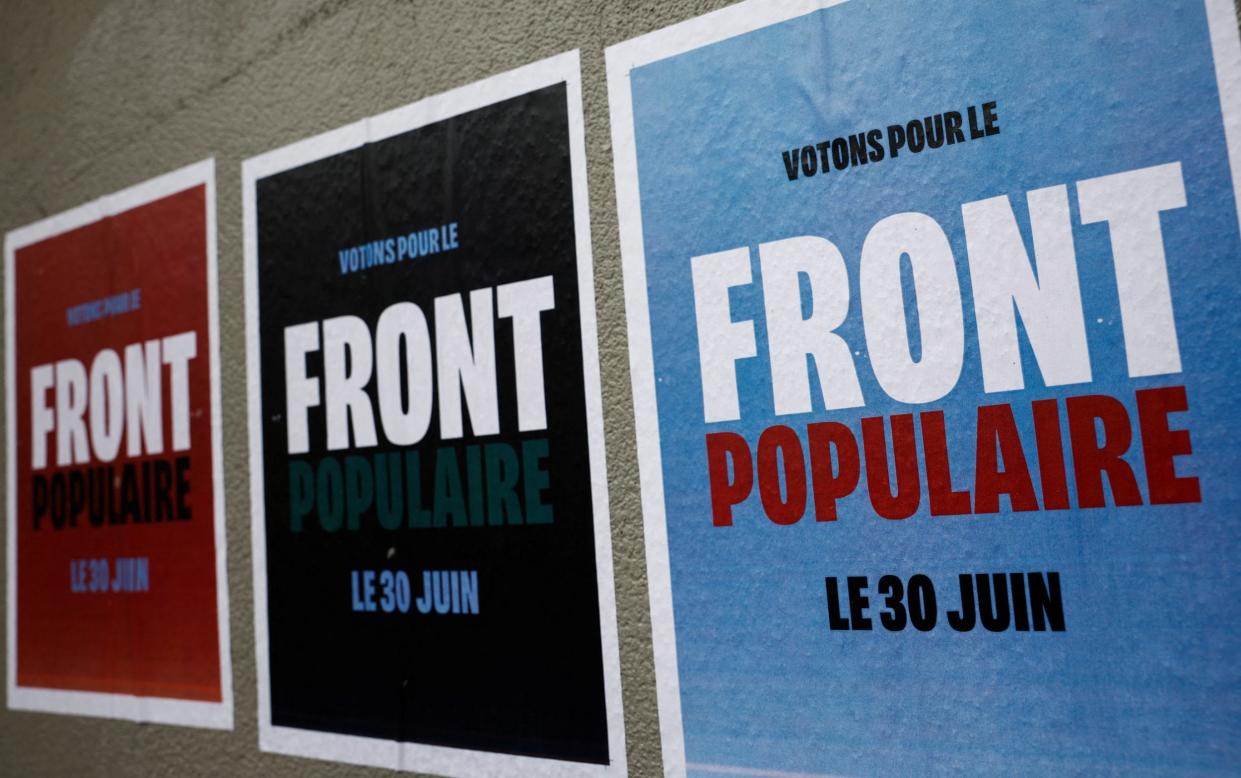The French Left is sharpening the guillotine

- Oops!Something went wrong.Please try again later.
- Oops!Something went wrong.Please try again later.
Late at night on Friday last week, in the midst of the mad scramble for getting election documents in time in the shortened calendar of our snap election (three weeks!), a typescript of the Left Alliance Nouveau Front Populaire manifesto started circulating in Paris.
It was a glimpse of a document said to be already at their printers, but several journalists, when they started skimming it, grabbed their phones to check that it wasn’t a brilliant fake concocted by Marine Le Pen’s National Rally. It seemed too demented to be true, from the capping of inheritances to “abolish billionaires’ privileges” (it will in fact hit millionaires first), to the “welcome” measures to help illegal migrants settle in France, with a new dedicated bureaucracy.
The morning brought a PDF of the official document, with catchy titles printed in bold red. There it was, practically all of it. The coalition, cobbled together within 48 hours as a supposedly “principled, cross-party Left Front opposing the extreme-Right”, from former Socialist president François Hollande to tiny Trotskyite micro-parties, seemed in effect to have delegated all powers to Jean-Luc Mélenchon’s France Insoumise (France Unbowed) and produced something even François Mitterrand, in 1981, when he took four Communist ministers into his Cabinet, would have recoiled from.
If you worried about Keir Starmer’s intentions, you may find a grim relief in realising that a short Channel hop from Britain, the French Left has moved into another dimension, out-Corbynising old Jeremy himself.
Their platform cancels every modest reform that successive governments have passed in the past 30 years, from pensions (retirement age would drop to 60 again) to a dole system that is still one of the most generous in Europe, to housing benefits, to creating tens of thousands of extra civil service jobs, to raising minimum salary by 20 per cent, and restoring an expensive benefits system that Emmanuel Macron’s administration had whittled down and means-conditioned. As for the working week, it will be lowered to 32 per cent, with no reduction in salary. Rent control will be strengthened
Even the British unions haven’t (yet?) thought of demanding that 30 per cent of corporate board seats should go to union reps, with an unspecified “right of intervention” in company policies. Or a priority for employees to buy their own workplace in preference to any bidder. Any economic aid to businesses, big or small, will depend on their ESG performance, with fines up the total amount of received subsidies.
As for farming policy, it is based simultaneously on an organic mantra and on a state-administered system “guaranteeing… each farmer a holding where they can start a family farming unit”.
To pay for all this, there will be taxes. Many, many, many taxes, in a country where they already are the highest in the OECD. (France is the most redistributive country in Europe, having overtaken Denmark a couple of years ago.) Mitterrand’s wealth tax will come back, of course, as well as a sharply progressive income tax with 14 tax bands, a climate tax, an exit tax, an inheritance tax reaching 100 per cent for “the (unspecified) rich” and tightening further the current system which already reaches 45 per cent above £1.5m for direct descendants, and above £22,000 for everyone else, a “distance tax” on imports, an exit tax (to anyone leaving the country), green taxes — and that’s just for the first hundred days.
French Reds want more green measures. The manifesto decrees moratoriums galore: on the use of pesticides, Sri-Lanka-style; on water reservoirs farmers use during droughts; even – mooted in campaign debates – on Emmanuel Macron’s courageous nuclear plants programme, on which they want a “referendum”. Banks will be forbidden to offer finance to fossil energy ventures of any kind. The manifesto creates a new status for “climate refugees”, in effect offering asylum-seeker status to all of them, with fast-tracking of their legal situation. (It also decrees a “universal right to all public services for anyone present in the country”, in effect guaranteeing the clogging up of an already clogged welfare system.)
Foreign policy is boringly predictable. Needless to say, Israel is targeted for punitive measures: the manifesto calls for the EU-Israel trade agreements to be suspended, conditioned to Israel respecting human rights” (not a word on the other countries in the area), arms sales to Israel to be banned, all based on the ICJ’s “risk of genocide” canard. France would also leave CETA, give up on Mercosur, and in general promote a “peace diplomacy”, heavy on virtue-signalling measures: it fosters a “feminist diplomacy”, the creation of an International Court for Climate and Environment Justice, lifting patents on vaccines and pandemic medicines, and diplomatic initiatives to demilitarise and depollute space.”
There is more: the platform is 24 pages long. The likelihood of it being entirely adopted is, to be honest, remote, if only because, just like for François Mitterrand’s first changes 40 years ago, national and international pushback will be almost immediate. But not only will some demagogic measures squeeze through (we’re facing a return of a wealth tax that always cost more to enforce than it brought to state coffers, for instance, and caused the departure of tens of thousands of the most productive individuals in the country), the essential damage will be done.
France, once again, will be seen as an unpredictable, business-averse place to be avoided, where long-term plans will seem impossible. It will weaken us, Europe, and the West. This, I promise you, won’t be in British interests.

